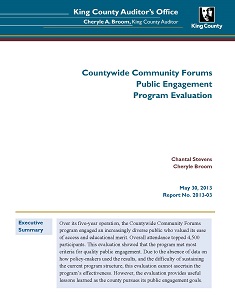Countywide community forums public engagement program evaluation
May 30, 2013
Over its five-year operation, the Countywide Community Forums program engaged an increasingly diverse public who valued its ease of access and educational merit. Overall attendance topped 4,500 participants. This evaluation showed that the program met most criteria for quality public engagement. Due to the absence of data on how policy-makers used the results, and the difficulty of sustaining the current program structure, this evaluation cannot ascertain the program’s effectiveness. However, the evaluation provides useful lessons learned as the county pursues its public engagement goals.
Summary
This review evaluates the effectiveness of the structure, process and ability to meet expected outcomes of the Countywide Community Forums (CCF) as established by Ordinance 15896 and implemented as a new public engagement program between 2007 and 2011. Although CCF’s operations were discontinued at the end of 2011, the CCF experience offers valuable lessons on developing and maintaining a public engagement program within King County.
We evaluated the Countywide Community Forums program from the standpoint of meeting the intent of its mandates, providing value to the participants and King County, and addressing the expectations of public engagement programs as outlined in the research. The following findings emerged from the evaluation:
- While the ordinance was useful in initiating the program, laying out the vision and ensuring some sustainability for the program, some specific requirements limited flexibility in its implementation.
- Reaching out to participants and keeping them involved was a challenge that required a host of innovative strategies. However, those who participated were generally satisfied with the ease of access to the forums and the quality of the experience, as well as the length, content and even-handedness of the videos and surveys.
- The small forum format is recognized as highly conducive to good deliberation and information gathering but was difficult to organize and sustain. Larger forums and on-line participation allowed the forums to reach wider and larger audiences.
- The reports were well received by policy-makers and other county stakeholders, although to a limited audience. Time pressures constrained the depth of the analysis and customization of their content.
- While the existence of a steering committee was viewed as useful, the composition as mandated by the ordinance was challenging.
- The program was expensive to support on a per-survey basis, but external funding was sufficient for three years and allowed for the proper functioning of the program. However, the funding’s origin, from a single source, gave the appearance of influence over the program’s operation and results.
- We cannot say with certainty that the program was effective. There are several aspects that were identified as working well, such as providing the public an opportunity to participate in learning more about King County. Many participants came from groups or communities that normally do not have that opportunity. Other results are more difficult to demonstrate, such as the forums impact on public policy-making.
- There is much that the program sponsors, county officials, volunteers and other stakeholders can highlight to illustrate value of their investment in this unique public engagement program.
At this time, CCF is no longer funded or operational. However, King County continues to pursue its public engagement strategic goal. This includes advancing equity and social justice. In that context, we offer the following observations or ideas. Consideration of these observations is dependent on the purpose and breadth of the public engagement effort.
- Establish the framework and intent for a public engagement approach in legislation; an implementation plan could be subsequently submitted for review
- Build upon the outreach approaches that allow for a broad representation of King County’s diversity
- Keep an advisory committee small and representative
- Incorporate a feedback mechanism between the public and public officials
- Keep communication materials focused, objective, interesting and brief
- Select timely topics and strive for balanced and unbiased portrayal of issues
- Provide the public sufficient information to form an opinion
- Incorporate the engagement process into the county’s decision-making deliberations
- Provide online and in-person participation opportunities, weighing the pros and cons of options
- Provide training and facilitation to participants
Reports related to this audit
Follow-up reports to this project are not available.
Currently, there are no related reports to this project.
Audit team
Chantal Stevens and Cheryle Broom conducted this audit. If you have any questions or would like more information, please call the King County Auditor's Office at 206-477-1033 or contact us by email KCAO@kingcounty.gov.

 Translate
Translate
